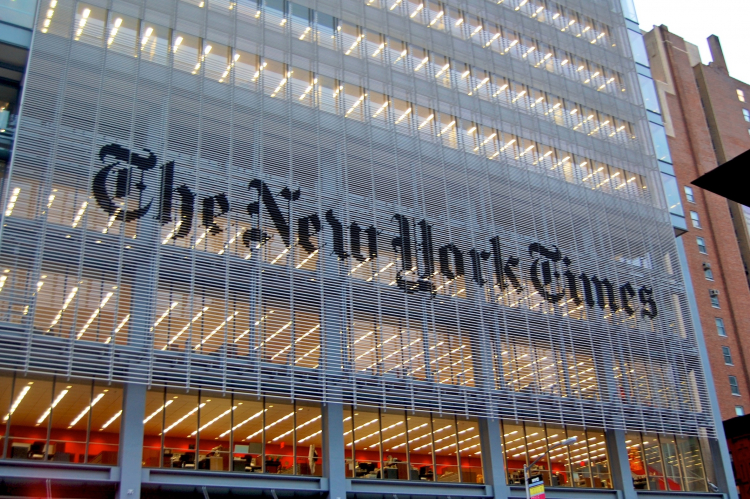The "Objective" Press: A Return to Biased Media?

"Old fashioned" journalism refers to the industry before it was professionalized, when media outlets were tied to political parties and funded by partisan groups. During the Industrial Revolution journalism became a societal institution, receiving funding from advertisements. This change in its business model allowed for journalism to be objective, but today we are seeing a return to the old model.
The New York Times has reached 4.7 million paying subscribers as of August 2019. By comparison, the Washington Post, which has not recently released information on its subscriber count, announced in 2017 that it had reached 1 million paying subscribers.
The subscriber base of the Times, in particular, has increased over the past four years due in large part to its argumentative relationship with the current president, a phenomenon known as the "Trump Bump." The newspaper added 265,000 digital subscriptions in the final three months of 2018, its largest increase since the president's election.
The subscriber base of the Times, in particular, has increased over the past four years due in large part to its argumentative relationship with the current president, a phenomenon known as the "Trump Bump."
The New York-based outlet has had a conflict-filled relationship with the president since the start of his term, as its reporters interviewed Mr. Trump and covered his policies and discourse. In return, the president developed the epithet of "the failing New York Times" and has even called the newspaper an "enemy of the people."
It is also worth noting that the Wall Street Journal has been criticized by some of its own staff for not being hard enough in its coverage of Trump, a critique that implies its journalists expected harsh coverage of Trump in the first place.
The Times covers how "Trump Fires Back, Accusing Women of 'False Smears'," in October 2016. Image Credit: Getty Images/Ty WrightThe president's tumultuous relationship with the Times has drawn in many left-leaning Americans that subscribe to get their daily scoop of Trump activity. With a growing base of subscribers composed of these readers, it would not be a surprise if the Times also stepped a bit away from non-partisan journalism to give their subscribers their money's worth of anti-Trump op-eds and even reporting.
For example, in October the Times reported on controversial comments Hillary Clinton had made about the 2020 elections. Clinton allegedly inferred, "Russia was 'grooming' Representative Tulsi Gabbard of Hawaii as a third-party candidate for president.” A correction, which was not posted at the end of the article as is typically done, amended the statement to say that Republicans were grooming Gabbard. Clinton said “they” were grooming, but the Times decided to put their own bias on it.
An October article was amended discretely. Image Credit: Delton HowardWhen the president tweeted, “Trade between China and North Korea grew almost 40% in the first quarter,” in 2017, the ensuing Times article discredited the source of that fact and later stated, “China’s trade with the North grew 37.4 percent during the first three months of the year.” After casting doubt on the president's sources, the article ended up saying exactly the same thing.
The NYT clashes again with the president. Image Credit: Delton HowardThe New York Times is not the only media outlet that describes itself as “objective” but has been labeled left-leaning. Some speculate that the Washington Post has also demonstrated an anti-Trump bias, for example in their coverage of the assasination of al-Baghdadi, a world-despised terrorist. After Trump announced al-Baghdadi’s death, the Post's article was headlined, “Abu Bakar al-Baghdadi, austere religious scholar at helm of Islamic State, dies at 48.”
Americans reacted in outrage over the Post's positive portrayal of a well-known terrorist. Some speculated that the headline was made to contradict Trump's triumph over killing al-Baghdadi. The headline was later amended to clarify that al-Baghdadi was a “terrorist-in-chief.” The error was quickly made light of by social media, sparking the tag #WaPoDeathNotices, where users came up with more euphemistic headlines such as “Adolf Hitler, passionate community planner and dynamic public speaker, dies at 56.”
The Washington Post quickly edited its headline after receiving sharp criticism online. Image Credit: Delton HowardUnlike what many believe, American journalism simply isn’t unbiased or objective. Although a lack of objectivity in journalism could lead to a breakdown of trust in the media, most news consumers still trust their preferred media outlets - whether those lean left, right or to some debatable affiliation anchored in social media.
This brings us to how social media giants like Twitter, Facebook, and Google are reacting to this polarization of U.S. media. It is important to note that Facebook and Google own 73% of all digital advertising in the U.S. This makes it difficult for news organizations that rely on objective reporting to get advertising money via social media because provocative articles displaying negative partisanship (loathing of the opposite political group) have far more interactions on social media than “objective” articles do.
Considering that the future of the news lies in social media, it is also important to consider how various 2020 presidential candidates have interacted with these tech giants. For example, Elizabeth Warren expressed her desire to dissolve Facebook, as according to her it has “too much power.” On the opposite end of the spectrum, Facebook CEO Mark Zuckerberg dined at the White House in October, in a meeting that went unreported until recently. It might not be a stretch to think that Facebook itself could become polarized in favor of Trump in the 2020 election.











